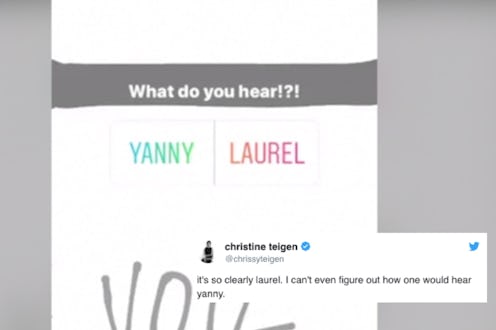We all officially lost hope back in 2015 after the Internet spent weeks debating whether a dress was blue and black or white and gold, so I'm having a bit of déjà vu this week. If you've been online at any point since Monday, you've likely heard the viral audio clip of a robotic voice saying either Yanny or Laurel, depending on who you ask. The list of people who have shared their opinion on this include Chrissy Teigen, U.S. Senator John Kennedy and everyone you follow on Twitter. But why do you hear Yanny or Laurel?
The clip was originally posted by YouTuber Cloe Feldman, and it has garnered nearly 100,000 likes and more than 40,000 retweets since it was posted on Twitter Monday night. Before that, it tore through Reddit earlier this week. Where did the audio even originate? Much like the infamous dress, we aren't sure where it came from and why it's torturing us. But since we're having such an impassioned debate about the topic — I feel betrayed by anyone who hears Yanny — it's natural to wonder why we're hearing different things. (Editor's note: it's obviously Yanny.) It's easy to just chalk it up to some sort of mysterious magic, but scientists have their thoughts on the phenomenon and are generous enough to share their opinions with the rest of us.
CNN interviewed Brad Story, a speech, language, and hearing sciences professor at The University of Arizona. Story told the network that the recording's low quality is one reason we're all fighting over what it says. "Part of it involves the recording," he is quoted as saying in the article. "It's not a very high quality. And that in itself allows there to be some ambiguity already." Story also talked to Quartz, and the professor even drew a graph with waveforms to explain why Yanny and Laurel sound similar. Basically, our cellphone and computer speakers may be responsible for the auditory illusion, because the frequencies between Yanny and Laurel are similar. (For the record, Story came to the conclusion that the clip is actually saying Laurel, which is a win for me and any other Laurel enthusiasts.)
Nina Kraus, a professor at Northwestern University who studies hearing, cognitive neuroscience and language development, told Quartz that "the way you hear sound is influenced by your life in sound." So the sounds you've heard in the past also have an impact on whether you're Team Laurel or Team Yanny, and the language you speak could even influence what you hear. In contrast to Story, Kraus and her colleagues all heard Yanny, so even auditory experts aren't on the same page about this.
Story, who will go down in history as the definitive Laurel/Yanny expert, tells Popular Science that there's actually a simple way to end all of the madness. "With a high-quality recording, and if all listeners were listening with the same device, there may not be any confusion," he tells the publication.
Meanwhile, the New York Times concludes that we don't have an actual answer yet. But Dr. Jody Kreiman told the publication that the confusion is likely caused because of acoustic patterns. Kreiman, a professor at the University of California, Los Angeles, explains it like this. "The energy concentrations for Ya are similar to those for La," she tells the Times. "N is similar to r; I is close to l."
You probably feel vindicated if you're Team Laurel after reading expert opinions, but it's a bit concerning that we've all spent so much time thinking about this audio clip and debating it with loved ones. I can only hope that the person responsible for mystifying the entire Internet comes forward and puts this thing to rest. It may otherwise tear the very fabric of society apart.
